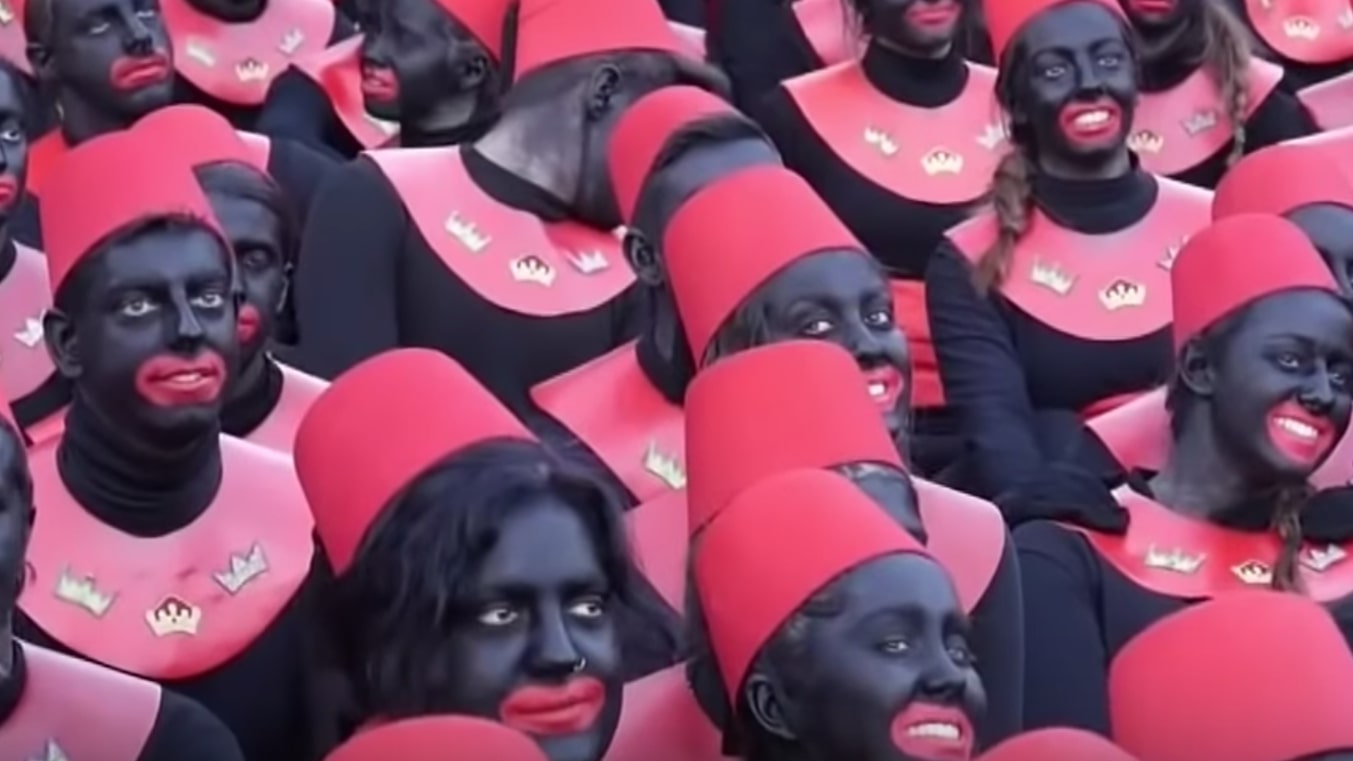Twitter users were outraged on Monday when videos emerged of a parade in Alcoy, Spain, commemorating Three Kings Day with hundreds of teenagers dressed in blackface.
Three Kings Day, also known as Epiphany Day or El Día de los Reyes, is a celebration of the biblical tale revolving around three kings, or magi, who brought gifts to Jesus after his birth. In Spanish culture, these three kings are meant to represent Asia, the Middle East and Africa. Over time, the tradition has evolved to include Black slaves who the Spanish believe accompanied the kings.
Traditionally, hundreds of people paint their faces black and their lips red before marching through towns on January 5 every year. The Black slaves hand out gifts and candy to children in Alcoy and are viewed locally as similar to Santa's elves.
Antoinette Soler, founder of Spanish magazine Afroféminas, recently wrote a powerful op-ed criticizing the racist tradition and said she had already submitted a request to the government seeking to stop it from happening.
“It is offensive. It is very offensive because it stereotypes, falsifies and makes fun of our image, which is not included. We are real people, we are not fantasy characters that can’t be found in the streets of Alcoy and the rest of Spain,” Soler wrote.
In Spanish newspaper El Pais, Alcoy councilor for heritage and tourism Lorena Zamorano Gimeno defended the tradition, saying that the Black slaves "use red ladders to climb up onto balconies and deliver presents to children."
The newspaper added that the tradition is more than 100 years old and that more than 2,000 people take part in the parade.
“We respect all opinions but in this case we believe there has been an interpretation that is not in any way connected to the experience that takes place in Alcoy. What has hurt the people of Alcoy most is that we have been called racists by people who haven’t even experienced our procession first hand,” Gimeno said.
Nathalie Labeau, a writer for Afroféminas, told El Pais that the tradition was part of a larger culture of racism in Spain that has real-world effects.
“Since the 19th century, this festival has been perpetuating racism year after year. It is based in an imperialist and colonial history that celebrates white superiority over the racial inferiority of communities of Afro-descent,” she said.
This year, the event caused considerable backlash online when global soccer superstar Andrés Iniesta posted a photo to Twitter of his family dressed in blackface for the holiday.
???????????????????????? pic.twitter.com/RhCXAj1AqB
— Andrés Iniesta (@andresiniesta8) January 6, 2019
More videos of the parade made their way to Twitter, featuring hundreds of Spanish teenagers smiling and laughing while dressed in blackface. In interviews conducted by local outlets, the teenagers said blackface is an integral part of their culture and that the tradition would never be stopped.
Hundreds of teenagers don #blackface for 'Three Wise Men' parade in #Alcoy
pic.twitter.com/AuT96hq1zv— 5 News Australia (@5NewsAustralia) January 6, 2020
Although the parade is an annual tradition, social media has given the world a glimpse into the event, creating an immense amount of anger and questions about the nature of the celebration.
These colonizers know that blackface is offensive…don't let them play dumb. https://t.co/rg1Rg2PJx4
— ????Divided We Fall???? (@YtH8r) January 6, 2020
Lol @ people in the replies saying that Spain having no history of American-style blackface minstrelsy somehow absolves this racist caricature of its racism
Do you also think you can say the n word just bc it's an English word associated with American racism? https://t.co/mCb07pz9sA
— astropolitical/sociophysical (@keshawnrants) January 7, 2020
There is a petition! Already closed about that racist issue! … Many people are working for ending it!
Petición · #STOP BLACKFACE IN SPAIN · https://t.co/uHOJ8RWA7j. @DegatoIrie https://t.co/U74OVkp3t6
— 爪ᎥᖇᎩმ爪 (@Miryam1968) January 6, 2020
“tHEy’Re HOnOrinG tHe mOOrs”
You can honor someone WITHOUT using blackface. It’s not that hard.
Spain has a history of racism, colonialism, and colorism.
People will hide racist shit behind “traditions” https://t.co/mrPnRphQxY
— ???? Hibiscus ???? (@Alley__cat_) January 8, 2020
They’re dressed as Moors. The people that came and civilized Europe when these people didn’t know how to wipe they’re own ass. https://t.co/C7k8jVNE2E
— Don Ali (@DonAliDey) January 7, 2020
Blackface in Spain is disgustingly pervasive. https://t.co/UgCdpKorkT
— Óscar García Hinde (@OGHinde) January 6, 2020
Spare me the "Spain doesn't know about WS racism/blackface" argument. The Spanish were some of the first pioneers to institutionalize chattel slavery & have multiple traditions like this that celebrate running out the Moors (blk ppl) from Spain. Spain is rooted in White supremacy
— Vespi???????? (@Vespii009) January 7, 2020
Blackface is an integral part of Christmas holiday celebrations in many European countries and despite the negative response from the rest of the world, residents of the Netherlands and Spain have been particularly defiant in continuing the practice.
Right-wing parties in Spain and the Netherland have seized on the controversy and pushed people to continue the parades.
There is now an effort in Spain to have the Three Kings procession in Alcoy added to the UNESCO Cultural Heritage of Humanity list. Spain already lists the blackface parade as an event of national tourist interest and has added it as an "Intangible Cultural Heritage."
